🤓 The 2026 Local Search Ranking Factors are here!! Check out the report!
🤓 The 2026 Local Search Ranking Factors are here!! Check out the report!



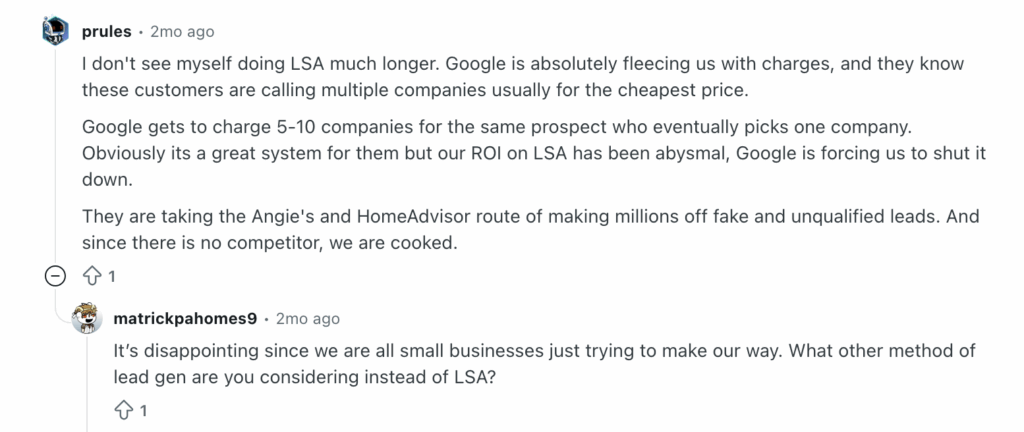
While Google’s Local Service Ads program (LSA) works well as a lead generation investment for many companies, lots of local business owners are dissatisfied with what they perceive as high costs, poor ROI, and a flawed model. Complaints like the one shown above are rife on Reddit and other platforms. While LSA fees are often cited as being lower than those of Google’s other monetized programs, even small investments can put a strain on the budgets of small businesses.
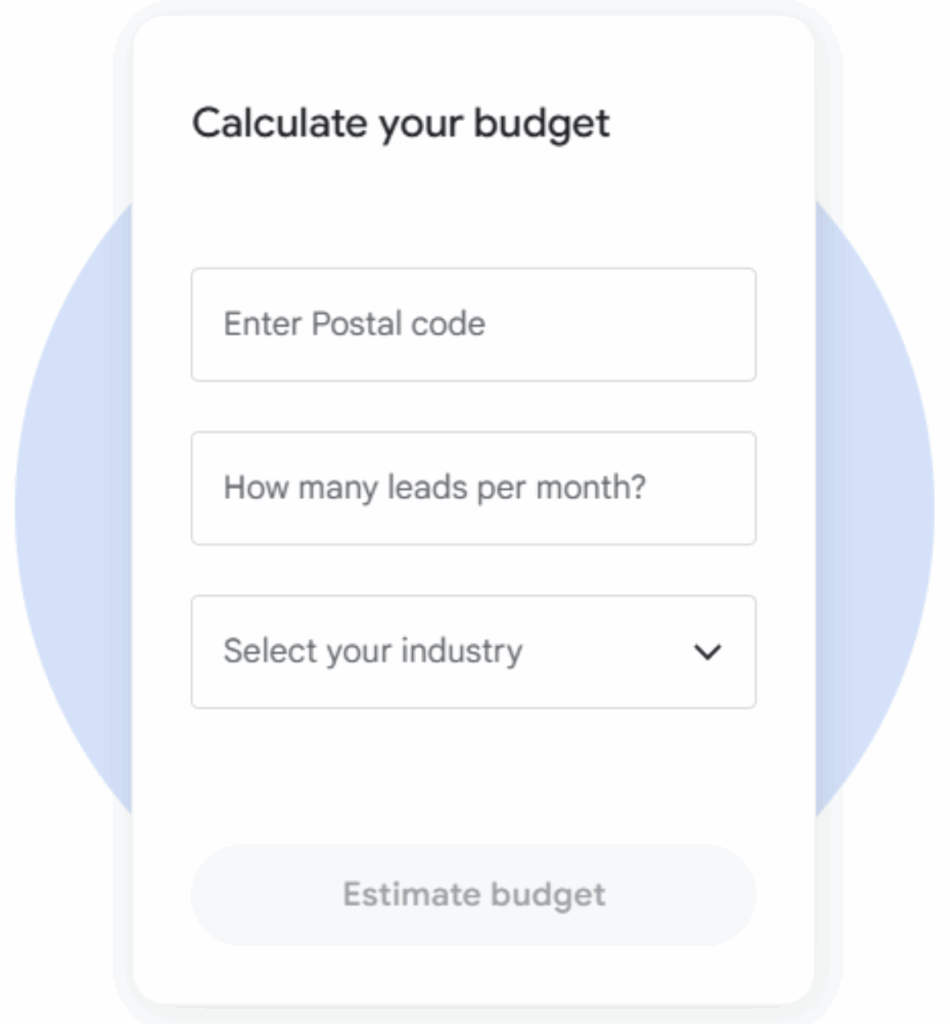
While Google’s LSA landing page offers the above calculator for estimating ad spend, any lead you have to pay for is going to cost more than one you acquire without the fees of a middleman.
At Whitespark, we recently conducted a popular study on The Prevalence of AI Overviews in Local Search to discover the inroads Google’s AI-generated results have made into the arena of local-intent queries. Today, we’re offering the results of a new study we’ve conducted, with the goal of answering one big question:
Does searcher intent matching offer you any way to sidestep Google LSA fees?
If LSA is already working like a charm for you, then today’s study may not be a source of welcome relief, but if your business would love to get some leads you’re not paying Google for, read on!
Whitespark conducted manual research in three major US cities (Houston, Phoenix, and Denver), across six industries (plumbers, personal injury lawyers, dentists, optometrists, medical clinics, and real estate agents). We ran a total of 540 queries across these combinations of city + industry, and we were not physically located in any of the geographies in which we searched.
Our queries were broken down into three different categories of intent:
When this study refers to local intent queries, we mean the most basic searches that specify what a searcher needs and where they need it, like plumbers in Houston, personal injury lawyers in Denver, or optometrists in Phoenix.
When this study refers to informational intent queries, an immediate transaction is not always at play. For example, “what’s the difference between an optometrist and ophthalmologist in Houston?” indicates that the searcher is in a research phase, rather than necessarily being on the verge of a transaction.
When this study refers to hybrid intent queries, we mean searches that combine both local and informational intent, such as “how much do contact lenses cost in Houston?” or “what is the cost of hiring a real estate agent in Phoenix?”
All of the searches we performed fall within cities and categories that have become eligible for LSA inclusion since its 2016 rollout:
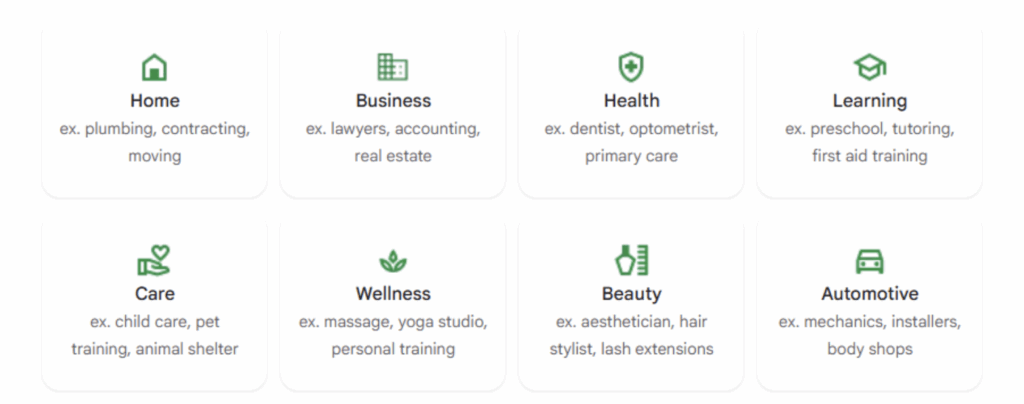
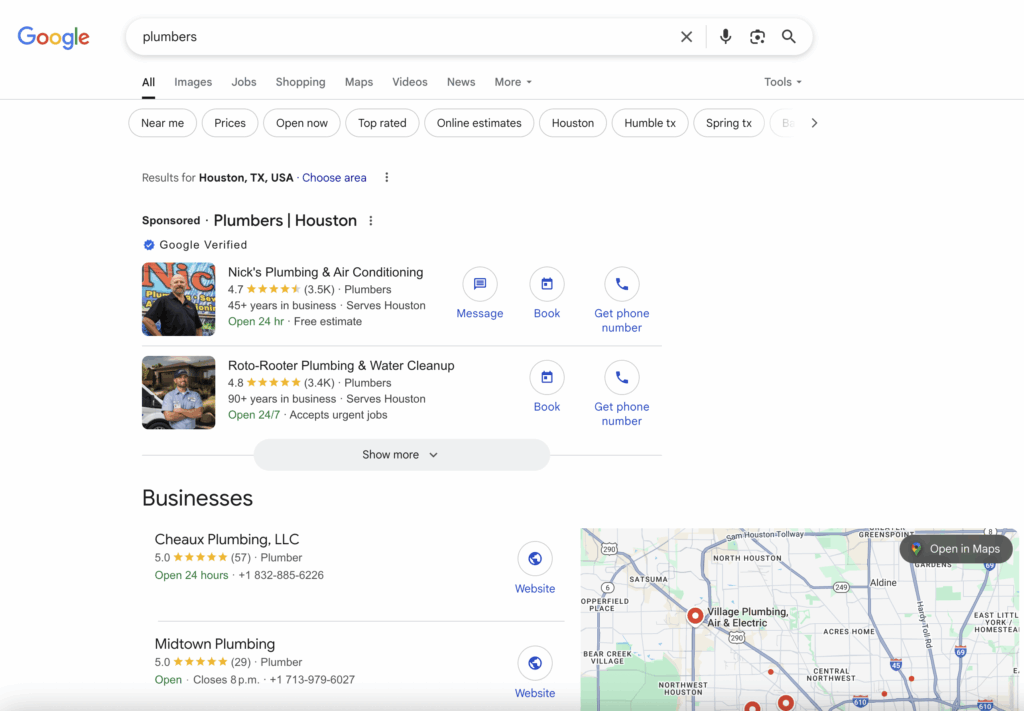
When this study references LSAs, we are talking about the section of paid listings marked “sponsored” and “Google Verified” which comes up for specific local searchers (shown above).
We’ve also heard anecdotal reports of LSAs possibly appearing within AI Overviews as part of Google’s ongoing experimentation with monetizing their AI product.
Unlike traditional local and organic results in Google’s system, business owners must pay-to-play in the LSA environment.
👉 Conclusion: LSAs are far more likely to appear for local intent queries than for informational and hybrid queries.
Other findings of note:
While there’s little you can do about feeling forced to opt into Google’s lead gen business for competitive visibility for local intent queries in LSA-dominated markets, what we’ve discovered here about the low percentages of these ads for information and hybrid queries is an invitation to strategic marketing.
How can you turn local and hybrid intent queries into leads you don’t have to pay Google a penny for? While every business is unique, your strategy will typically revolve around two investments:
For this exercise, let’s imagine you’re the owner of a plumbing business in Denver, and you’ve identified that you want to come up in Google’s organic results for informational and hybrid queries about frozen pipes because you’ve realized these are LSA-independent wins you can get. Page one visibility has been earned by the above company for seeing an opportunity to connect with their community on this topic during an oncoming weather event called an Arctic Chill.
By filming a video short offering several helpful tips for preventing pipes from freezing, the business has won this level of visibility:
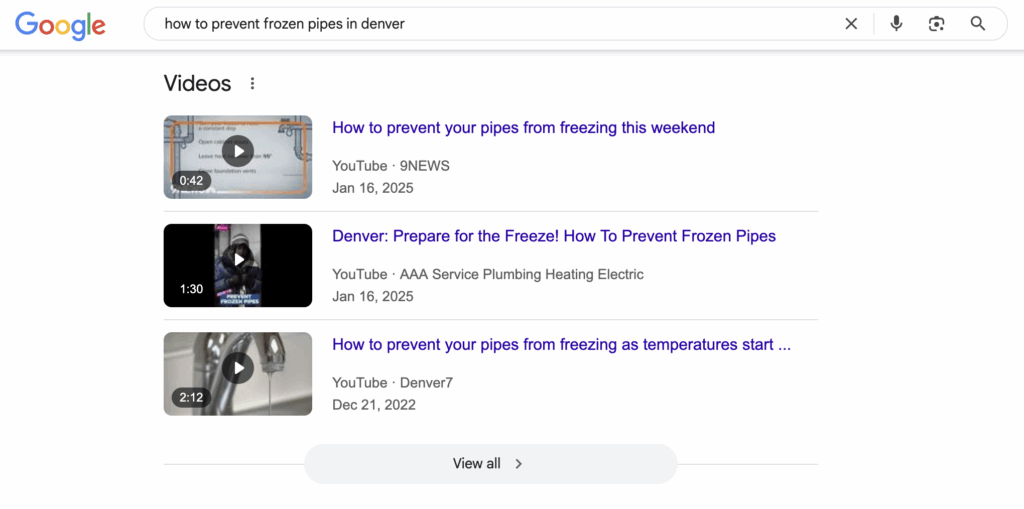
Several things I like about this video are the emphasis on helpfulness coupled with no hard-sell, combined with the cleverness of the staff member wearing a company uniform and standing next to a company-branded vehicle. This is a good fit for informational and hybrid queries because it matches the intent of someone who may not be ready to make a purchase right this minute. Instead, the video delivers a good experience with the plumber, developing local brand recognition that could influence consumer decision-making the next time they need a plumber.
First-party content which showcases your authority and matches informational/hybrid intent search language can include the text content of your website and social media profiles, video content, and image content. It can also include participating (not hard-selling!) in social communities like a subreddit for your city.

Check out how this thread features a new neighbor from a hot climate not knowing how to keep their plumbing safe in Denver weather. If the Reddit community allows it, this is an opportunity for the plumber to step in with their professional knowledge, without being salesy. By becoming known in the online versions of your local community, you can earn trust by being helpful, and hopefully earn customers from these interactions over time.
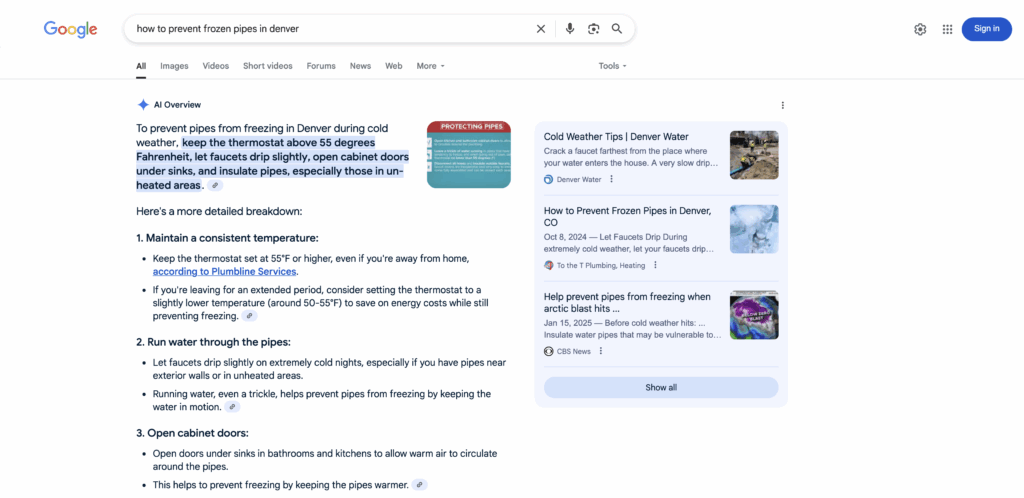
In addition to developing and optimizing your own content to match local and hybrid intent query language, you can increase your chances of visibility in Google’s results by being cited and linked to by third-party publishers in reference to these topics.
💡 Early-days thought leadership on getting included in AI overviews suggests that having your brand name cited in close proximity to the words you want to be visible for is a core tactic. In the above AI Overview results for the query how to prevent frozen pipes in denver, the sources in the right sidebar are the ones Google’s product is scraping content from.
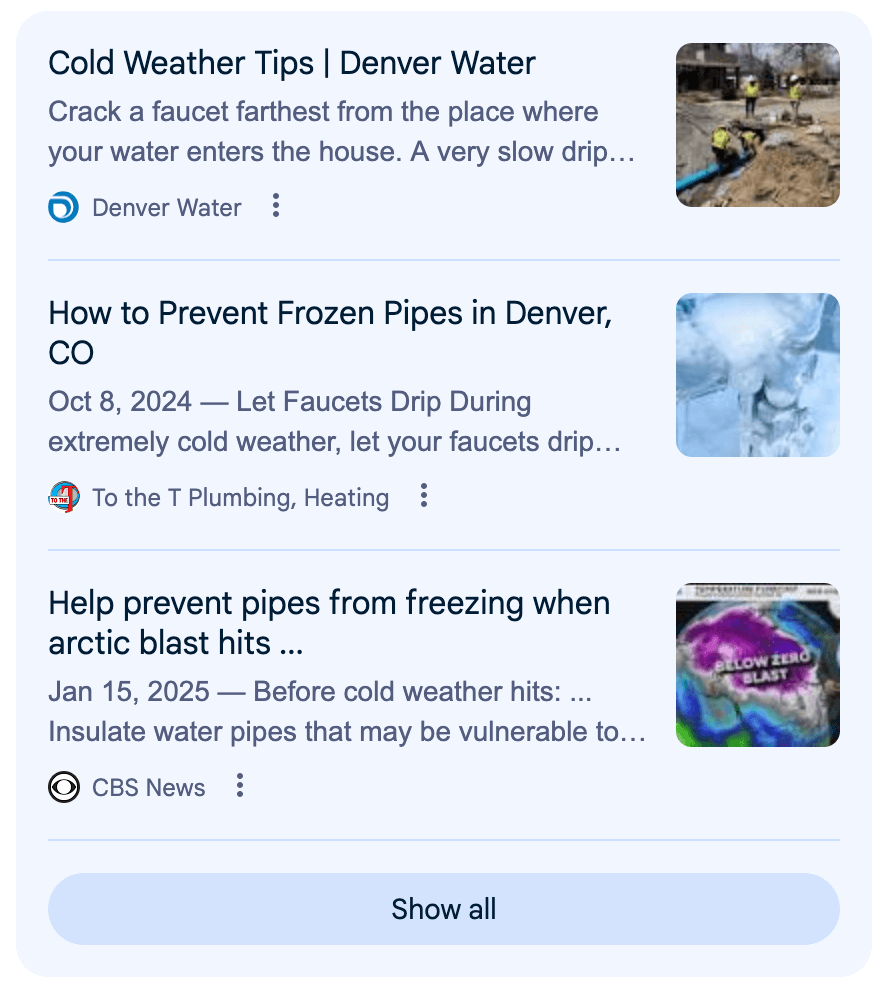
Two of these entries are going directly to local plumbing businesses because of the first-party content they’ve published, but the first entry is the local water utility. Often, best-of lists and similar publications appear in these spots. If a business can earn a citation (a mention) or link from a third-party in association with the desired search phrase, it’s theorized that this could increase their chances of being brought up as an AI Overview source.
In addition to going after AIO inclusion, citations and links from any third-party that is ranking prominently for your desired terms are a visibility win. Here, for example, is a local news channel ranking highly for our example search phrase:
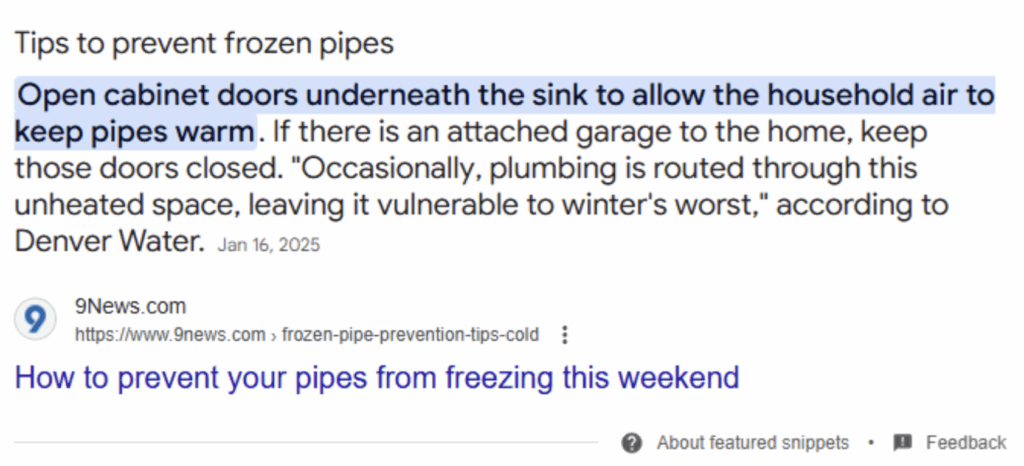
Local news sites, hyperlocal blogs, and local/industry podcasts and video channels are all excellent sources of citations. Other opportunities for being mentioned include your business sponsoring local teams and events, hosting or speaking at local events, and cross-promotion with fellow local business owners. The nice thing about citations and links is that you can often specify how you’d like to be cited. This gives you an opportunity to associate your brand name with desired keywords.
In the local SEO context, the more words a search contains, the more likely it is to have an informational or hybrid intent. Searchers tend to add more modifiers when they are trying to find out something specific that isn’t being answered by Google when a simple local intent search is entered.
To get your mind percolating, here are the informational and hybrid intent phrases we used in our study. Even if your business does not fall within these six categories, looking at these phrases can help you come up with a list of similar searches for your scenario.
Experiment with all of these methodologies to uncover good intents you could be matching.
1. Train staff to document the more complex questions customers ask in person and by phone.
If aspects of your business require authoritative answers, they could be good topics to cover with your content publication.
2. Use Google’s autocomplete feature by beginning to type a search phrase into their search box and noting down informational/hybrid-type queries that appear in the dropdown.
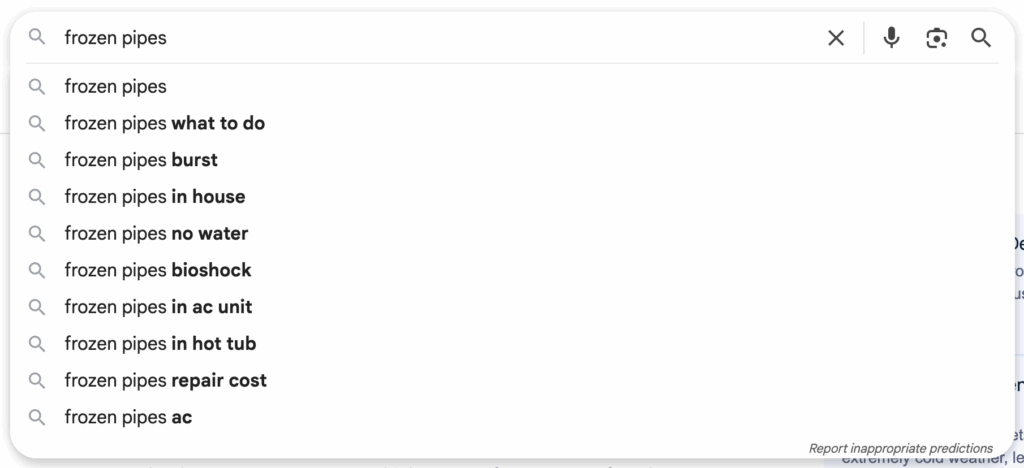
3. Look for the “People also search for” feature that appears in many of Google’s organic results and commonly contains lots of informational/hybrid searches that the public is doing.
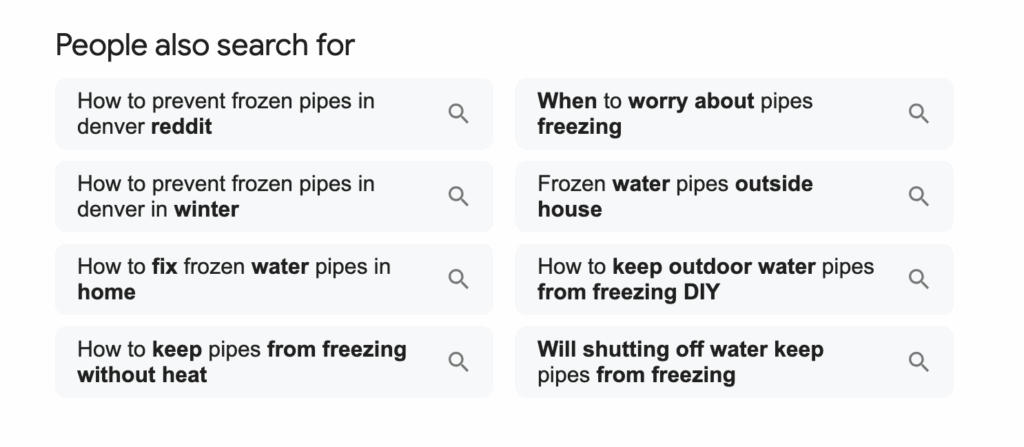
4. Practice social listening on social media platforms like Reddit and Nextdoor.
Note down how people talk about problems your business can solve with authoritative content.
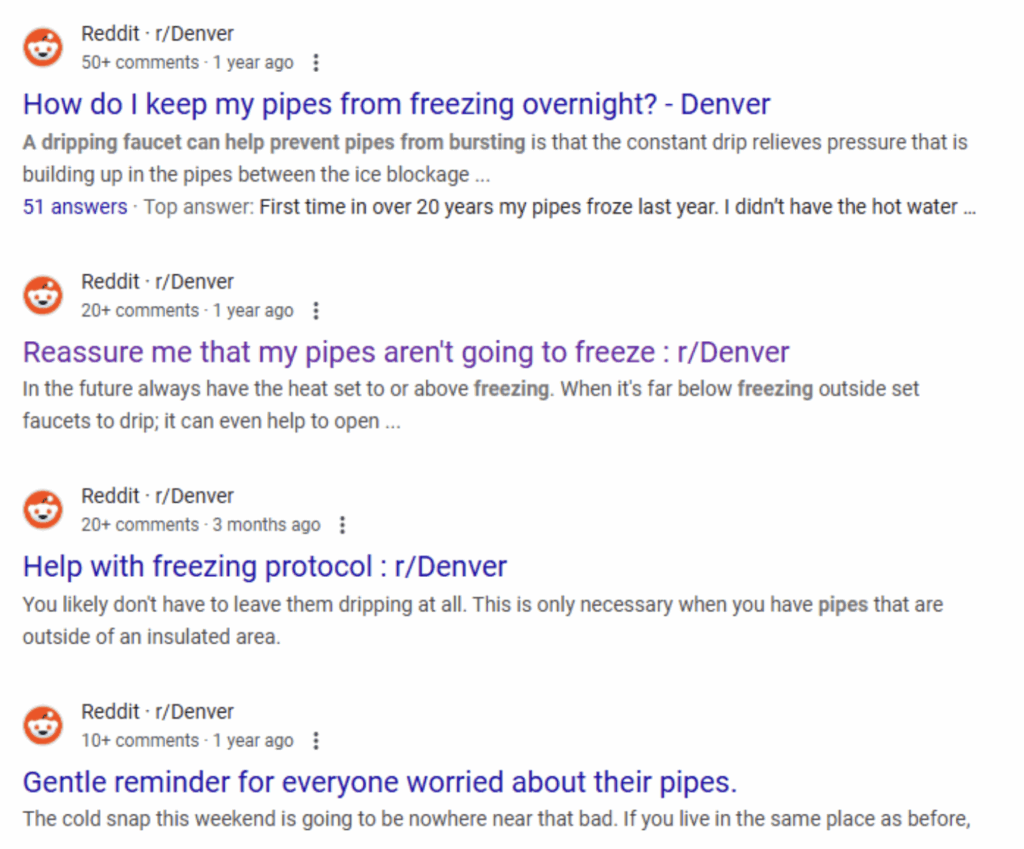
5. Use keyword research tools.
SaaS brands like Semrush and Moz have free trials of traditional keyword research tools and some products enable you to filter by intent. Question-based keyword research tools can be especially helpful for identifying longer-tail queries with a high degree of informational intent. “Answer the Public” and “Also Asked” are two popular tools of this kind.
6. Take our example phrases and plug them into your AI chat tool of choice (ChatGPT, Gemini, Claude) with the prompt:
“Please give me 30 more [informational/hybrid] intent keyword phrases similar to the ones I have pasted below:”
As always with any AI tool, fact check for accuracy.
While LSAs impact each city/industry combination differently, there is a strong pattern of Google showing this paid content for more local intent searches than for informational/hybrid searches. Non-LSA lead opportunities can be earned by demonstrating authority in both first- and third-party contexts for informational and hybrid queries. If your budget is feeling the LSA pinch, relief may come from you researching these types of queries and fulfilling them with content that solves searchers’ problems and features your brand name in close proximity to specific phrases.
And don’t forget the power you have offline to cut out middlemen. Developing the kind of in-person consumer experiences that result in word-of-mouth referrals is your best bet for becoming as Google-independent as possible!

Miriam Ellis is a local SEO columnist and consultant. She has been cited as one of the top five most prolific women writers in the SEO industry. Miriam is also an award-winning fine artist and her work can be seen at MiriamEllis.com.
Whitespark provides powerful software and expert services to help businesses and agencies drive more leads through local search.
Founded in 2005 in Edmonton, Alberta, Canada, we initially offered web design and SEO services to local businesses. While we still work closely with many clients locally, we have successfully grown over the past 20 years to support over 100,000 enterprises, agencies, and small businesses globally with our cutting-edge software and services.